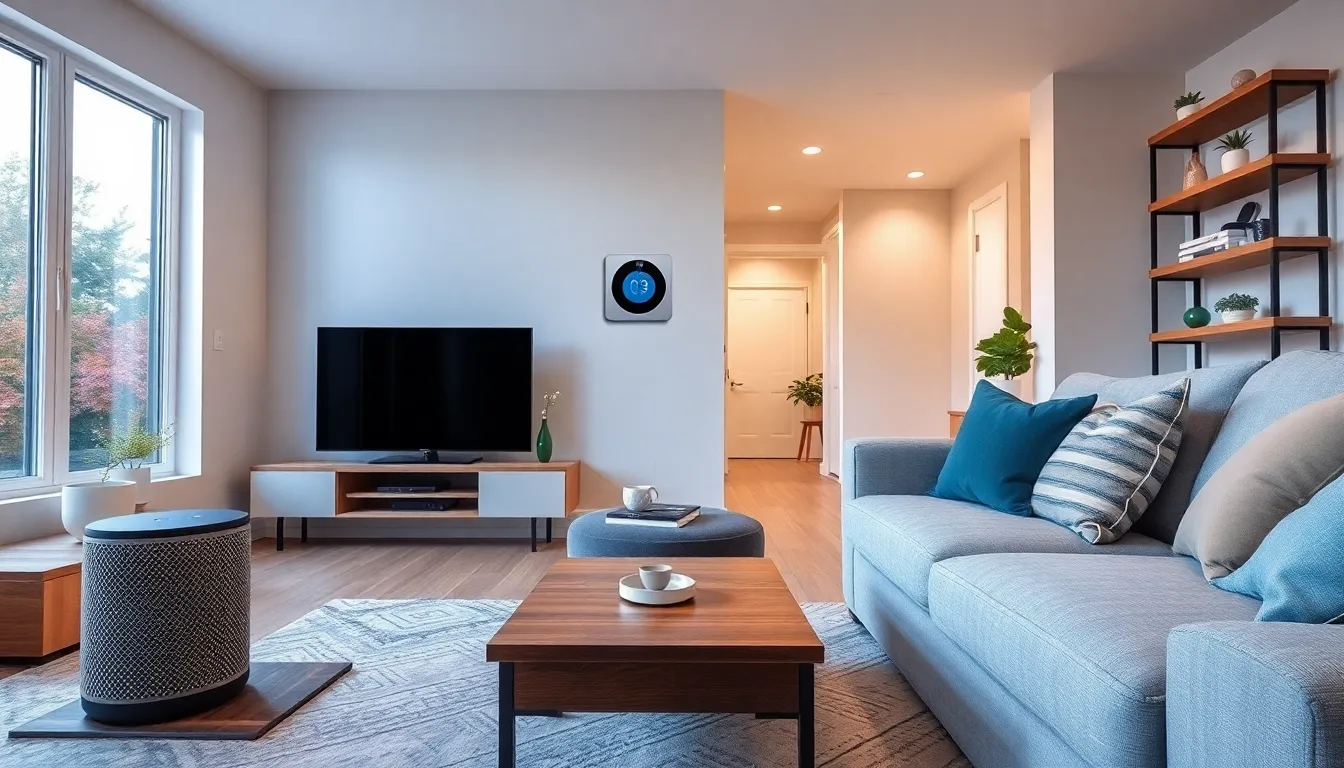Table of Contents
ToggleImagine waking up to the smell of freshly brewed coffee, all thanks to your AI-powered coffee maker. Sounds like a dream, right? Well, with AI integration at home, that dream is just a smart plug away from reality. From managing your morning routine to keeping your home secure, artificial intelligence is transforming the way we live—one gadget at a time.
But it’s not just about convenience; it’s about making life a little more fun. Picture a robot vacuum that not only cleans your floors but also gives you the latest news while dodging your pet like it’s in a game of laser tag. AI isn’t just a tool; it’s your new quirky housemate, ready to lighten your load and add a sprinkle of humor to your day. So let’s dive into the world of AI integration and discover how it can turn your home into a smart sanctuary.
Understanding AI Integration at Home
AI integration at home refers to the incorporation of artificial intelligence technologies into everyday household tasks. This technology enhances convenience, efficiency, and enjoyment in daily life.
What Is AI Integration?
AI integration involves connecting various devices and systems throughout a home to streamline operations. Smart assistants like Amazon Alexa and Google Assistant control lighting, security, and temperature. Through machine learning, these systems adapt to user preferences, making interactions seamless. Homeowners can monitor and manage devices using smartphones or voice commands, ensuring ease of access. Understanding this technology enables users to create an interconnected ecosystem that elevates their living experience.
Benefits of AI in Daily Life
AI offers numerous advantages that enhance day-to-day experiences. Time savings often result from automating repetitive tasks such as cleaning and grocery shopping. Personalization increases with AI, allowing devices to learn individual habits and suggest tailored solutions. Security systems equipped with AI monitor home activity, providing alerts and peace of mind. Additionally, energy management becomes more efficient, leading to cost savings on utility bills. These benefits underscore the role AI plays in transforming home life into a more streamlined and enjoyable environment.
Types of AI Technologies for Home Use

AI technologies play a vital role in enhancing home life. These innovative solutions offer convenience, security, and efficiency across various applications.
Smart Assistants and Speakers
Smart assistants and speakers, such as Amazon Alexa and Google Assistant, enable seamless voice control of household devices. They help manage daily tasks by setting reminders, controlling music, and providing weather updates. Users find it easy to ask questions or create shopping lists without lifting a finger. These assistants learn from interactions, improving responsiveness over time. In homes, they serve as central hubs, integrating multiple smart devices for streamlined management.
Home Automation Systems
Home automation systems allow users to control lighting, heating, and appliances remotely. Devices like smart thermostats and smart bulbs adjust settings automatically according to user preferences. Through smartphone apps, individuals can schedule operations or monitor energy consumption. Automation enhances comfort through personalized environments, making life easier and more efficient. These systems also offer integration with security features, ensuring a comprehensive approach to home management.
Security and Surveillance Solutions
Security and surveillance solutions provide peace of mind through advanced monitoring technologies. Smart cameras and video doorbells capture live footage, sending alerts directly to users’ smartphones. Many systems incorporate AI for facial recognition, identifying familiar faces and potential intruders. Users appreciate the ability to control and monitor their home security from anywhere. Enhanced features like motion detection and two-way audio further improve responsiveness, ensuring safety around the clock.
Practical Applications of AI Integration at Home
AI integration at home transforms daily life by enhancing security, streamlining tasks, and improving energy efficiency.
Enhancing Home Security
Smart security systems provide real-time monitoring through AI technologies. Advanced cameras analyze footage for unusual activity, sending alerts immediately. Facial recognition features identify visitors accurately, adding a layer of safety. Homeowners often utilize smart locks that respond to mobile commands, allowing remote access. Systems include doorbell cameras that capture video and send notifications directly to smartphones. Enhanced lighting solutions automatically illuminate pathways at night, deterring intruders effectively.
Streamlining Household Tasks
AI-powered devices automate various household chores, saving time and effort. Robot vacuums clean floors efficiently, navigating obstacles with ease. Smart dishwashers determine optimal settings based on load size and soil level. Voice-activated assistants help manage grocery lists, schedule reminders, and control appliances. Automated meal preparation tools adjust cooking times and temperatures to simplify dinner. Laundry machines with AI capabilities can select the best wash settings based on fabric type and weight.
Improving Energy Efficiency
AI technologies optimize energy usage throughout the home. Smart thermostats learn user behaviors, adjusting temperatures for comfort and efficiency. Energy monitoring devices track consumption patterns, identifying areas for savings. Automated lighting systems turn off lights in unoccupied rooms, reducing waste. Solar panels equipped with AI manage energy storage effectively, maximizing utilization. Homeowners benefit from knowing their monthly energy costs through real-time feedback.
Challenges and Considerations
Integrating AI into home life presents various challenges that need careful consideration. Addressing these issues ensures a smooth transition into a more automated living environment.
Privacy and Security Concerns
Privacy concerns arise as AI devices collect and store data about user behavior. Hackers may target smart home systems, leading to potential breaches of personal information. Users must stay informed about the data usage policies of their devices. Implementing robust security measures, like strong passwords and two-factor authentication, significantly reduces these risks. Regular software updates enhance device security, safeguarding sensitive information from unauthorized access.
Cost of Implementation
Costs associated with AI integration can vary widely depending on the technology adopted. Smart assistants and automated systems often require initial investments that some homeowners may find substantial. Ongoing expenses, such as subscription fees for smart services, can also accumulate over time. Budgeting for these costs helps assess the long-term affordability of AI technologies. Evaluating the potential savings from increased energy efficiency may justify the initial investment.
User Accessibility
User accessibility plays a crucial role in the successful integration of AI at home. Some individuals may find it challenging to navigate complex technologies. Ensuring that devices provide intuitive interfaces can enhance user experience. Voice-activated controls and mobile apps contribute to making smart home technologies more accessible to everyone. Training sessions and educational resources can assist those unfamiliar with AI technologies, promoting broader usage within households.
AI integration at home is reshaping the way people experience daily life. By enhancing convenience and introducing playful elements into routines, these technologies create a more enjoyable living environment. From smart assistants managing household tasks to advanced security systems ensuring peace of mind, the benefits are clear.
As homeowners embrace these innovations, they also face challenges like privacy concerns and costs. However with careful planning and awareness, integrating AI can lead to a streamlined and efficient home. The future of home life is undoubtedly exciting as AI continues to evolve, offering endless possibilities for enhancing comfort and security.








